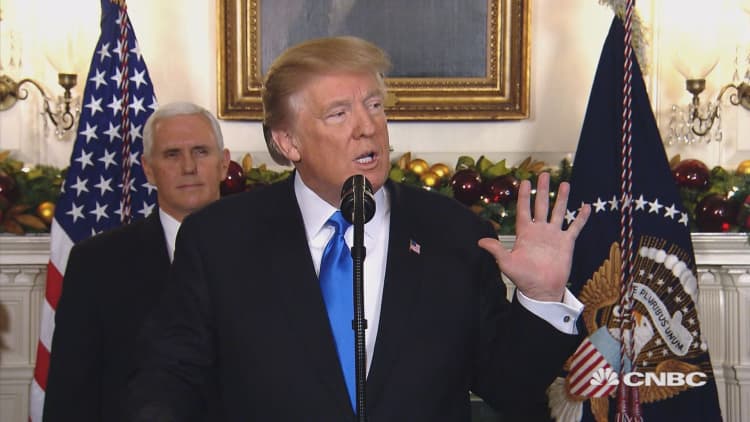There's a whole range of reasons why bond yields are falling, and President Donald Trump's decision to move the U.S. embassy in Israel from Tel Aviv to Jerusalem is another.
Strategists say the bond market has been concerned about progress on tax reform and how effective it will be once passed, including the addition of new debt.The market is also concerned about the potential for a government shutdown and now more geopolitical tensions in the Middle East.
Jerusalem is a city important to Judaism, Christianity and Islam and by endorsing it as the capital of Israel, Trump could be seen as ending the idea that the U.S. would back the ultimate location of a Palestinian capital in the city. U.S. allies, like Jordan, Saudi Arabia and France have objected.
In announcing the decision just after midday, Trump said it was not intended as a departure from the U.S. commitment to facilitating a peace agreement acceptable to both the Israelis and Palestinians. "I intend to do everything in my power to help forge such an agreement," he said, adding Jerusalem is one of the most important elements in those talks. But the market is concerned there could be unrest or terrorist attacks in retaliation.
"It's a little bit of concern about the government shut down, combined with the reality of the details in the current proposal of tax reforms as well as some of the geopolitical stuff, following Trump's recent decision to move the U.S. embassy to Jerusalem. I think the geopolitical risks increased on Trump's decision on the margin," said Ian Lyngen, head of U.S. rate strategy at BMO.
The 10-year yield was at 2.32 percent Wednesday from 2.42 percent as recently as Friday. The yield curve continued to flatten, as the gap between 10-year and 2-year yields narrowed.
"Washington is dominating everything at this point," said Michael Schumacher, head of rate strategy at Wells Fargo.
Strategists said there have been doubts about what shape the tax bill will take and whether it will really have much positive impact on the economy.
The market is also reflecting some concerns that President Trump said the government shut down could come over the weekend, but House Republicans have been pushing to extend the deadline to Dec. 22.
House Democratic leader Nancy Pelosi said, in a tweet, that Democrats are hopeful Trump will be open to an agreement to keep the government open.
Andy Brenner, global head of emerging markets, fixed income at National Alliance, said the bond market has also been lifted by good overseas buying in U.S. Treasurys, as the yield on German bunds continue to fall. Yields move opposite price.
"I think this has probably to do with a little bit of expectation that the budget may not pass," said Brenner, who doubted the Jerusalem news had much impact.
At this time of year, there are plenty of reasons for exaggerated behavior in the bond market as investors take actions ahead of year-end.
"The government shut down is just noise," said Peter Boockvar, chief market analyst at Lindsey Group. He said the fact that three central banks meet next week could also be a factor since they are increasingly moving to tighten policy. The Fed is expected to raise interest rates Wednesday.
"People are realizing the tax cuts here are financed by taxes raised there. Will be it be good for corporations and lower the tax rate? Yes, but will it be good for residents of a third of the U.S. economy?" he asked, referring to high tax states like New York and California. "No, it will be terrible for them."
Boockvar said the market is beginning to focus on the trade offs. "To me, the market had a one track mind—a 20 percent tax rate. It didn't matter how they got there," he said.
Lyngen said the uncertainties around tax legislation are clearly a factor, including the fact that it does not seem to have wide public support.
"We have an economy that 70 percent consumer driven, and if nobody thinks they're going to be helped by this bill then an expectation for broad-based inflation and economic growth is hard to get your arms around," he said.
WATCH: Trump says Jerusalem is Israel's capital



